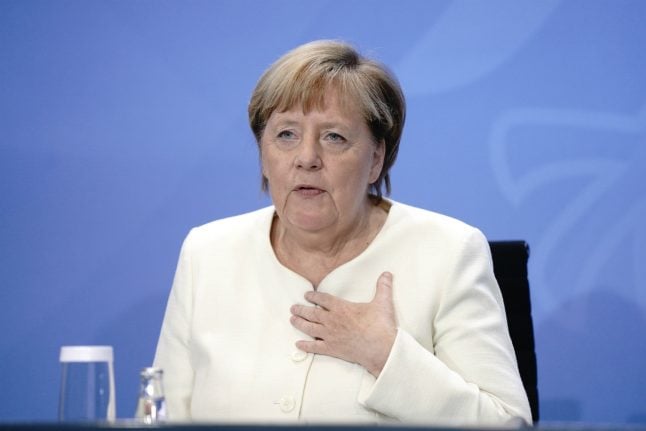The Chancellor presented Germany’s new “hotspot strategy” following a meeting with state leaders on Tuesday.
Merkel, of the centre-right Christian Democrats (CDU), said the regional spikes in coronavirus infections were a “cause for concern”.
“We know that more difficult times are before us, namely the autumn and winter months,” added Merkel.
She said the only way to keep the pandemic in check is to trace the chains of infection.
With recent huge outbreaks in the country traced back to weddings, family gatherings and parties, Merkel said “a reaction is therefore necessary” to halt the spread of the virus.
Any region where infection rates reach 35 per 100,000 would be required to impose a cap of 50 people maximum at gatherings in public spaces or rented venues.
If rates shoot up to 50 per 100,000 people, then only 25 people would be allowed at public gatherings.
READ ALSO: Should Germany opt for a coronavirus traffic light warning system?
Federal states failed to agree on rules for private parties at home but Merkel said they “strongly recommend” that people limit guest lists to just 10 at home in the hardest-hit regions.
Here’s what else has been agreed so far:
In view of the continuing high number of infections – currently at around 2,000 per day in Germany, no further reopening steps of public life are to be allowed at present.
Merkel reiterated the importance of taking targeted, local action against regional outbreaks, but said a new “shutdown” or lockdown, like the one that took place in March and April, must be prevented at all costs.
As The Local reported, citizens who give false information about themselves in a restaurant, bar or cafe face a minimum fine of €50 in future. “This is no trivial offence,” Merkel explained. “The operators must ensure that people are giving real information… if names like Donald Duck are provided, it is not hard to spot,” she added.
READ ALSO: These are Germany’s proposed new rules for coronavirus
In cases of doubt, restaurant owners or hairdressers should ask for ID cards to verify the details, she said, something that could provoke some resistance in Germany where privacy is fiercely guarded.
In a bid to step up the fight against Covid-19 and increase awareness among the German public, two more letters are to be added to the “AHA” (which stands for Abstand halten, Hygiene und Alltagsmaske) formula that Germany advises for keeping distance, hygiene and wearing so-called everyday masks.
The two extra letters are “C” to stand for ‘Corona Warning App’ and “L” to stand for “Lüften” or ventilation.
Merkel said ventilation is one of the “cheapest and most effective measures” in the fight against the virus.
‘More masks, less parties, less alcohol’
Ahead of the autumn holidays, Bavarian premier Markus Söder warned against travelling abroad.
He said that “workplace, day-care centres and schools” were now of particular importance. “More masks, less parties, less alcohol” was the motto of the Bavarian state chief.
When asked, Merkel explained the model calculation she had presented to her CDU colleagues on Monday – the Chancellor had warned Germany could see 19,200 new infections a day by Christmas.
“We had 300 new infections in June, we now have 2,400 new infections on some days,” said Merkel.
The cases would therefore have doubled three times in three months. If this were to continue over the next three months, October, November and December, “we would go from 2,400 (…) to 19,200”, said the Chancellor. This is the “essence of exponential growth”, she added.



 Please whitelist us to continue reading.
Please whitelist us to continue reading.
Member comments